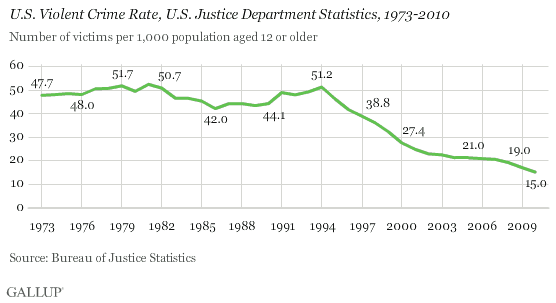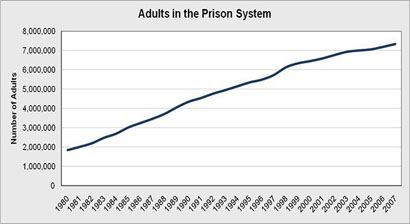|
|
Background on Crime |
Crime topics in the 2024 election cycle:
| Rank | Country | Rate per 100,000 inhabitants | Number imprisoned |
|---|---|---|---|
| 1st | El Salvador | 1,659 | 109,519 |
| 2nd | Cuba | 794 | 90,000 |
| 3rd | Rwanda | 637 | 89,034 |
| 4th | Turkmenistan | 576 | 35,000 |
| 5th | United States | 541 | 1,808,100 |
| 13th | Turkey | 424 | 362,422 |
| 14th | Brazil | 392 | 850,377 |
| 35th | Russia | 300 | 433,006 |
| 65th | Iran | 228 | 189,000 |
| 132nd | China | 119 | 1,690,000 |
| 163rd | Canada | 90 | 35,485 |
| 178th | Germany | 68 | 57,955 |
| 209th | India | 41 | 573,220 |
| 216th | Japan | 33 | 40,881 |
The National Crime Victimization Survey found the lowest overall crime rate since the survey began in 1973. Since 1994, violent crime rates have declined, reaching the lowest level ever recorded in 2010. Property crime rates continue to decline as well.

Despite the falling crime rate, taking into account both violent crime and property crime, 83 percent of Americans can expect to be a victim of crime at least once in their lifetime.
The opposite viewpoint from ‘Three Strikes’ focuses on the increasing prison population. In this view, along with prison privatization, imprisonment has become big business, and hence subject to political pressure to increase imprisonment. In particular, black males are ever more likely to be imprisoned.

‘Broken Windows’ laws mean that police focus on ‘quality of life’ issues as much as on crime itself. By addressing even minor crimes such as broken windows, according to this theory, a community is less likely to tolerate any crime, and overall crime rates should fall.
‘Community Policing’ refers to a policy of crime prevention replacing incident response. It is often accompanied by a ‘broken windows’ policy, or by increased police presence on the streets.
A ‘tort’ means a civil infraction as opposed to a criminal violation. ‘Tort reform’ includes capping lawsuit rewards; banning ‘frivolous lawsuits’; or some other change in civil lawsuit procedures.
The death penalty is currently implemented in 32 states (down from 34 in 2012). It was re-legalized by a Supreme Court decision in 1977. Since then, 1,392 people have been executed. About 3,000 inmates remain on ‘Death Row.’ Texas is by far the national leader in executions—it has executed 518 people as of November 2014, or 37% of the national total. (Oklahoma is a very distant second with 111). Florida is fourth, with 89 executions, but has 404 people on death row as of Nov. 2014 (only California has more, with 745).
Much of the current controversy about the death penalty focuses on the circumstances where it should be applied, and on its unequal application among racial and socioeconomic classes. About 52% of death row inmates are Black or other minority, versus 17% in the general population. Over 98% of death row inmates are male.
Congress defines ‘Hate Crimes’ as a crime in which the defendant intentionally selects a victim because of the actual or perceived race, color, national origin, ethnicity, gender, disability or sexual orientation of that person. Hate Crimes are covered primarily as racial or anti-gay issues under Civil Rights.
V. No person shall... be deprived of life, liberty, or property, without due process of law.... (1791)
VIII. Excessive bail shall not be required, nor excessive fines imposed, nor cruel and unusual punishments inflicted. (1791)
Related issues:
Drugs
Gun Control
Civil Rights
|
Click here for Amazon books on Crime.
Pro death penalty Anti death penalty Pro three strikes Anti three strikes Click here for references and citations on Crime. |